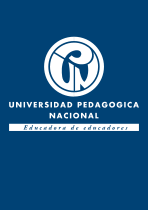La cultura juvenil desde la enseñanza de la geografía en el contexto del mundo contemporáneo.

Citación
Fecha
2011-02-26Autor
Santiago Rivera, José Armando
Enlace al recurso
https://revistas.pedagogica.edu.co/index.php/anekumene/article/view/7088Metadatos
Mostrar el registro completo del ítemResumen
Este artículo analiza el desenvolvimiento de la cultura juvenil y la enseñanza de la geografía en inicios del nuevo milenio. El actual escenario socio-histórico exige entender la circunstancia geográfica vivida, más allá de los fundamentos teóricos y metodológicos tradicionales de la enseñanza geográfica, como es usual en la formación educativa de adolescentes y jóvenes: descriptiva, enciclopedista y descontextualizada. Eso determinó realizar una revisión documental y exponer temáticas como el escenario de la época actual y la cultura juvenil; la nueva cultura y la elaboración de la subjetividad juvenil; la cultura homogénea y el cambio educativo y enseñar geografía para entender el cambio cultural. Se concluye que la formación educativa de adolescentes y jóvenes, debe posibilitar otros puntos de vista, desde posturas críticas y constructivas que revelen su conciencia y responsabilidad social, ante la complejidad vivida donde se construye la cultura de la uniformidad tecnologizada.
Abstract
This article analyzes the unfolding of the youthful culture and the education of geography in beginnings of the new millennium. The present partner-historical scene demands to understand the lived geographic circumstance, beyond traditional the theoretical and methodology foundations of geographic education, as he is usual in the educative formation of adolescents and young people: descriptive, encyclopedist and decontextualized.That determined to realize a documentary revision and to exhibit thematic like the epochal sceneand the youthful culture, the new culture and the elaboration of the youthful subjectivity, the homogenous culture and the educative change and to teach geography to understand the cultural change. One concludes that the educative formation of adolescents and young people, must make possible other points of view, frompositions critics and constructive that reveal his social responsibility brings back to consciousness and, before the lived complexity where the culture of the tecnologizada uniformity is constructed.
Editorial
Editorial Universidad Pedagógica Nacional
Fuente
Colecciones
- Anekumene [169]
